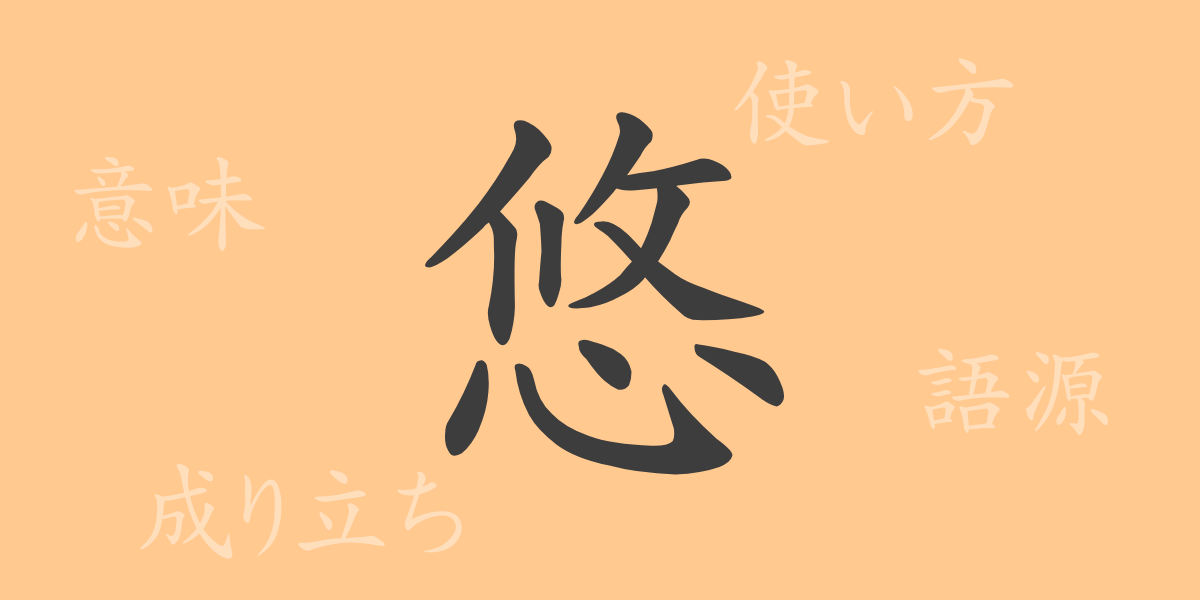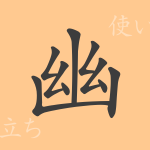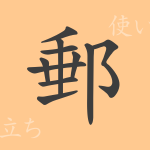The beauty of the Japanese language is reflected in its characters. Particularly, kanji (漢字) are ideograms that embody deep history and culture, each with its unique story. This time, we focus on the commonly used kanji “悠 (ゆう, yū)” and explore its allure. The calm and expansive connotations of this kanji are deeply rooted in the Japanese psyche. Let’s dive into the world of “悠 (ゆう, yū)” together.
Origin of 悠 (ゆう, yū)
The kanji “悠 (ゆう, yū)” can trace its origins back to ancient Chinese oracle bone script. Originally, this character was used as an ideogram meaning “eternal” or “distant.” The upper part of the character includes “忄 (りっしんべん, risshinben),” which represents “heart,” while the lower part combines the shape “甬 (よう, yō),” symbolizing a long, straight path. This combination evokes a sense of philosophical depth, suggesting an expanse of time and space.
Meaning and Usage of 悠 (ゆう, yū)
The kanji “悠 (ゆう, yū)” primarily signifies “distant,” “long,” and “leisurely.” It is often used to describe the expanse of time and space, as well as a carefree lifestyle or a relaxed attitude. Beyond its direct meanings, it also appears in poetic expressions and conveys emotions.
Reading, Stroke Count, and Radical of 悠 (ゆう, yū)
The kanji “悠 (ゆう, yū)” has several important characteristics:
- Reading: On’yomi (音読み, on’yomi) is “ユウ (ゆう, yū),” Kun’yomi (訓読み, kun’yomi) is “はるか (はるか, haruka)”
- Stroke count: 11 strokes in total
- Radical: 心部 (しんぶ, shinbu) (risshinben)
Idioms, Proverbs, and Phrases Using 悠 (ゆう, yū)
Idioms, proverbs, and phrases that include “悠 (ゆう, yū)” showcase the richness of Japanese expression. For example, “悠々自適 (ゆうゆうじてき, yūyūjiteki)” describes a carefree and leisurely lifestyle, while “悠長に構える (ゆうちょうにかまえる, yūchō ni kamaeru)” means to take things at a leisurely pace. Additionally, the term “悠久 (ゆうきゅう, yūkyū)” signifies an extremely long period, often used to express respect for history and tradition.
Summary of 悠 (ゆう, yū)
The kanji “悠 (ゆう, yū)” is a significant element that enriches the Japanese language with its beautiful form and profound meanings. Symbolizing the expanse of time and space, this character is deeply connected to the Japanese sense of spirituality and aesthetics. We hope that through this exploration, you have gained a glimpse into the unique worldview that “悠 (ゆう, yū)” offers. It is through a single kanji that one can uncover the deep beauty of the Japanese language.

























